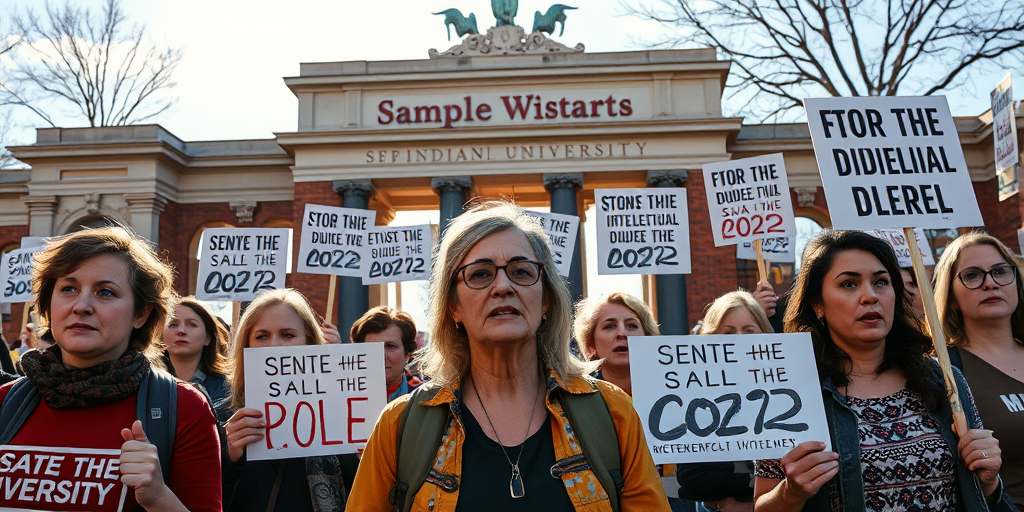IU Investigates Nearly 50 ‘Intellectual Diversity’ Complaints Under New Law
Indiana University (IU) has been at the center of a notable controversy revolving around intellectual diversity, following the implementation of Senate Enrolled Act 202. This law mandates public colleges in Indiana to encourage the teaching of diverse ideas by allowing community members to lodge complaints against faculty who allegedly fail to comply. IU reported receiving nearly 50 such complaints, sparking a debate about the balance between academic freedom and legislative oversight.
The Emergence of Complaints: Legitimate and Frivolous
Since the law’s enactment before the fall 2024 semester, IU has sorted through a significant number of complaints. Out of these, nine were deemed legitimate, including allegations of political bias in classroom presentations and failing to consider alternative viewpoints on specific subjects. These complaints originated from various campuses and involved different incidents, underscoring some faculty’s struggle to navigate the new expectations.
Conversely, IU dismissed 37 anonymous complaints, classifying them as “frivolous.” These complaints were interpreted as student protests against SEA 202 itself, reflective of broader opposition within the academic community. One notable example involved a professor focusing on the black female experience, criticized for excessive emphasis on the subject.
The complaints under SEA 202 constituted about 6% of all issues reported through IU’s EthicsPoint, a confidential reporting platform. A university spokesperson emphasized the importance of adhering to the law while ensuring fairness in evaluations.
A Broader State Picture and Institutional Responses
While Indiana University was a focal point, other public universities in the state reported little to no activity related to SEA 202. Purdue University, the University of Southern Indiana, and Vincennes University reported no complaints. Meanwhile, Ball State University documented three submissions concerning classroom dialogue, and Ivy Tech Community College dealt with a lone issue over perceived insufficiencies in classroom diversity, ultimately supporting the instructor’s approach.
Indiana State University also recorded one complaint but offered no detailed information. The varied responses across institutions highlight differing campus climates and administrative interpretations.
The Local Impact on University Culture
The introduction of SEA 202 has triggered widespread discourse within Indiana’s academic circles. Faculty members express concerns about being overly scrutinized and fear that the legislation may inadvertently stifle academic freedom. Students also face dilemmas about how to engage with controversial topics without fear of configuring faculty reputations or academic careers.
The atmosphere at IU mirrors broader tensions nationally over how to best safeguard intellectual diversity without impeding pedagogical freedom. Proponents argue that the law ensures a balanced representation of viewpoints essential for holistic education, while critics warn of potential overreaches and self-censorship among educators.
Connective Elements: Ongoing Challenges and Lawsuits
IU’s current situation is set against a backdrop of related legal and policy challenges. A recent federal ruling paused IU’s expressive activity policy following an ACLU lawsuit, further impacting how free speech and faculty expression intersect. Such developments amplify ongoing discussions on institutional policies around speech and curricular content.
The unfolding scenario at IU and the forthcoming judicial decisions may inform legislative actions across other states considering similar laws, shaping a new trajectory for higher education governance.
Future Implications for IU and Indiana
Moving forward, IU and similar institutions must navigate the complexities of SEA 202 while maintaining their mission to foster a robust academic environment. The challenges posed by the law indicate a possible recalibration of university roles in political and social discourses, potentially influencing how institutions frame their curricula and engage with diverse communities.
Supporters of SEA 202, like State Senator Matthew Taylor, argue for the law’s beneficial impacts. “Colleges are a place for discussion and debate. SEA 202 ensures all students get exposed to various perspectives, which are crucial for real-world readiness,” Taylor commented.
Balancing Stakes in a Contentious Landscape
The unfolding story at IU illustrates the pressing need for candid dialogue between lawmakers, educators, and students. Such conversations can guide constructive outcomes, ensuring that the pursuit of intellectual diversity does not imperil academic integrity or freedom.
As local residents continue to engage with the impacts of SEA 202, resources will play a crucial role in facilitating understanding and cooperation. IU’s administration plans outreach efforts to clarify procedural changes and meet stakeholder concerns proactively.
Engagement with these issues is vital for residents dedicated to preserving both educational quality and community interest. For more information, IU encourages dialogue through planned town halls and provides access to resources like EthicsPoint for any ongoing concerns.
Cognizant of the delicate balance required, stakeholders strive to uphold IU’s long-standing reputation as a bastion of innovation and rigorous scholarship. The path forward, inherently complex, will demand nuanced responses reflective of diverse perspectives and commitments to academic excellence.
Support independent journalism today. You rely on WFYI and other nonprofit news organizations to stay informed, and they depend on community support to continue their work. Consider donating to power this vital reporting today.







